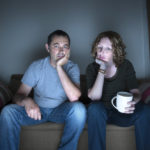Have you ever wondered why we have the tendency to ignore or deny truths until they overwhelm us? Whether it involves charges leveled at the Catholic Church for the behavior of some of their priests and bishops, or the question about why ordinary Germans didn’t stop Hitler from atrocities against mankind, or how Bernie Madoff bilked so many people before his Ponzi scheme was exposed, or why British Petroleum was allowed to drill for oil in the Gulf waters when they did not have the ability to plug the holes that they drilled, or how come it took us so long to acknowledge that our planet is growing warmer, or what were sub-prime mortgage lenders doing with your mortgage?
When you actually start looking at the places where we are often blind, you begin to notice them all around you. Why did your friend skip his medical checkup right before his heart attack? Why did your neighbor never question all of her husband’s business trips before he ran off with the other woman? Why did you re-start smoking when you knew the dangers? Why didn’t the stock holders or the boardrooms of major corporations question what the company was doing before it collapsed? Why didn’t the auditors and accountants see what was happening before the bank went into receivership? Why didn’t anyone in your family notice that your parents had a drinking problem? How is it that you ignored or justified how much debt you were getting yourself into to?
The answers to most—if not all—of the above questions has to do with people being willfully blind to things that are uncomfortable to admit, or threatening to confront. Legally, willful blindness is the concept that says that you are responsible if you could have known, and should have known something that instead you strove not to know. We think that being blind to certain things makes us safer, but in fact it leaves us crippled, vulnerable and powerless, says Margaret Heffernan in her new book Willful Blindness (Walker and Company Publishers).
We tend to look the other way when we come up against information or behavior that works against our self-interest. We overlook transgressions or lapses in ethics because it is in our self-interest to do so. So when we are in a dating relationship, this translates into us tending to overlook flaws and discount the disappointments and to instead focus on what we’re attracted to. Loving someone compels us to see the best in them. So, says Heffernan, “if things go wrong in a relationship, we hang on, trying hard to adapt, or to trivialize our worries. We find excuses (he’s had a horrible day, or a horrible childhood), we weave alternative interpretations (she didn’t really mean it, I must have misunderstood) or we may just trivialize the disappointment (it’s not a big birthday). We use considerable ingenuity to sustain our illusions, blind ourselves to inconvenient or painful facts. We protect our life with our illusions.”
This is why so many couples miss it when one of them gets involved in an affair. The betrayed spouse doesn’t connect the dots, because as long as the dots can be ignored, nothing is happening, nothing needs to be confronted and love remains intact. This is why child abuse goes on undetected and undiscovered for years. Especially if the abuser is the father/husband, and he is the major breadwinner for the family, the mother/wife may have a huge fear of not being able to make it on her own, not be able to financially make ends meet, and she may therefore fear that acknowledging the abuse would destroy her whole world and leave her poor and alone. And when child abuse scandals ripped through churches on at least three continents, the love of the church and tradition kept whole communities blind to what was going on, says Heffernan.
It comes down to whether you see yourself as an adult who can make choices and act on them, or whether you see yourself essentially as a child who is powerless and has to accept things as they are.






